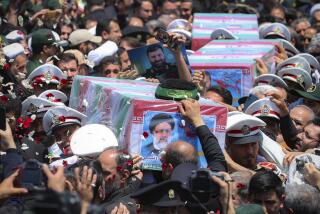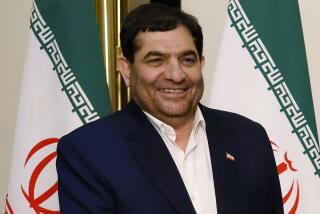Son of Late Shah Warns of Iran : Mideast: Mohammed Reza Pahlevi II said the nation poses an increased danger to Persian Gulf stability now that Iraq has been weakened.
- Share via
YORBA LINDA — The son of the late Shah of Iran warned Tuesday that the Islamic regime in his homeland poses an even greater threat to the stability of the Persian Gulf now that Iraq has been weakened in the Gulf War.
Mohammed Reza Pahlevi II, whose father was overthrown in a 1979 revolution, said that Western nations should be careful in resuming relations with Iran, even though it sought to arrange a cease-fire in the Gulf War and has been accepting Kurdish refugees from Iraq.
“The dependence upon outside forces to keep the Iranians in check is greater than ever before,” Pahlevi told a meeting of the World Affairs Council of Orange County on Tuesday at the Richard Nixon Library.
He said that despite improved relations between Saudi Arabia and Iran, major differences remain.
“(The Saudis) do not trust Iran and have every reason to fear the Iranian leadership,” he said. “(Saudi Arabia) will never accept the total withdrawal of all U.S. forces . . . so long as they are not sure of their security.”
Since the overthrow of his father, Pahlevi, known as Reza Shah II, has been living in the United States and Europe and has been advocating that Iran adopt democratic institutions and a multiparty system.
Pahlevi told a group of 340 people that because the West supported the military buildup of Iraq in the 1980s, Iraqi President Saddam Hussein was able to solidify power.
“The West remained silent in the face of Iraqi aggression,” he said. “The result of such policies throughout much of the 1980s was the containment of (Ayatollah) Khomeini’s fundamentalism within the borders of Iran but at the cost of bolstering an utterly ruthless dictatorship.”
Pahlevi added that he fears the reverse could be happening now, with the West condemning Saddam Hussein but not keeping a check on Iran.
“The West, because of its desire to keep Iraq isolated, has gone out of its way to overlook the unpredictable and dangerous nature of the Islamic regime much as it did with Saddam Hussein a decade before,” he said.
Pahlevi said the prospects for a lasting peace in the region hinge upon new leadership in both Iraq and Iran.
“So long as Iran remains in the grip of the brutal dictatorship, the likelihood of maintaining peace and stability in the Persian Gulf will be subject to the unpredictable whims of a savage few,” he said.
“Over the past decade, Iran and Iraq have been the only states to have endangered the peace and stability of the Persian Gulf,” he said.
More to Read
Sign up for Essential California
The most important California stories and recommendations in your inbox every morning.
You may occasionally receive promotional content from the Los Angeles Times.













